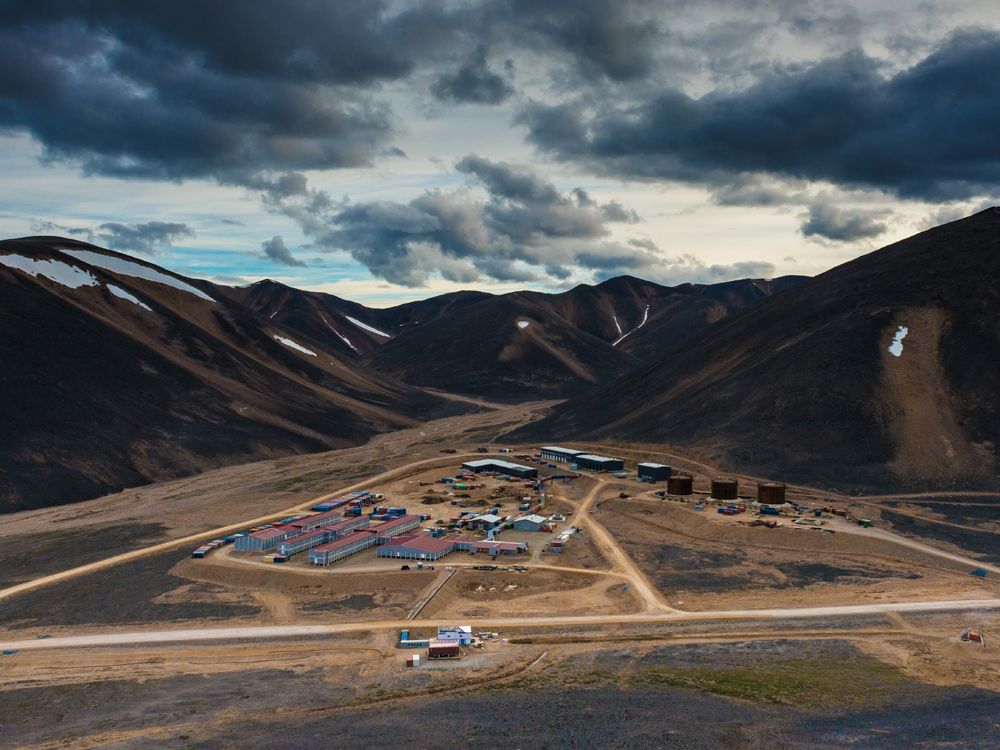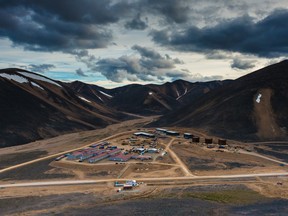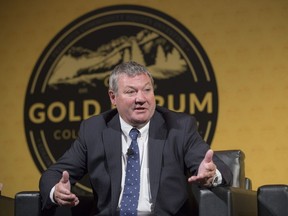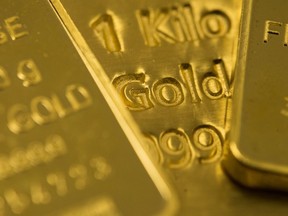‘It’s been a great place for us’: Kinross keeps mining in Russia despite widespread exodus

Company has abstained from criticizing Russia and indicated it plans to continue operating there as long as possible

Article content
A broad range of companies, from energy giant BP Plc to Apple Inc. to the world’s largest banks are pulling up stakes and cutting ties with Russia after its attack on Ukraine, leaving billions of dollars in business behind.
Advertisement
Story continues below
This advertisement has not loaded yet, but your article continues below.
Article content
The departures come as Western countries, including Canada, the U.S. and much of Europe, have imposed harsh sanctions on Russia in a bid to constrict its economy and compel it to end the invasion.
But at least one Canadian company, Toronto-headquartered Kinross Gold Corp., which operates a high-grade underground mine in the far east of Russia, has abstained from criticizing Russia and indicated it plans to continue operating there as long as possible.
Gold recently pierced a one-year high, reaching US$1,930 per ounce, up eight per cent in the past 30 days, a surge most attribute to the increase in geopolitical tensions as a result of the invasion.
In 2021, Kinross posted $1 billion in gross profit, but it has always traded at lower multiples to other gold mining companies because many of its mines are located in jurisdictions that analysts characterize as high risk, such as Russia and Mauritania.
Advertisement
Story continues below
This advertisement has not loaded yet, but your article continues below.
Article content
Kinross chief executive J. Paul Rollinson told analysts during the company’s fourth quarter earnings call on Feb. 18, as Russian troops were gathering on the border of Ukraine but had not yet invaded, that the company’s Kupol mine had all the supplies and workforce it needs to continue operating.
“All I can say is we’ve operated there successfully for many years with strong support from the Russian government,” Rollinson said, adding. “We’re good in our communities. We pay our taxes. And we think we’re quite welcome there, and it’s been a great place for us.”
We’re good in our communities. We pay our taxes. And we think we’re quite welcome there, and it’s been a great place for us
J. Paul Rollinson
During the same call, when asked about the impact of sanctions imposed in 2014 on Russia after it “annexed” Crimea from Ukraine, Rollinson said the value of the ruble fell, which actually “enhanced” margins for Kinross, presumably because its costs are paid in rubles but its gold could be sold for U.S. dollars.
Advertisement
Story continues below
This advertisement has not loaded yet, but your article continues below.
Article content
Since then, on Feb. 23, when the U.S. announced sanctions against Russia, Kinross issued a four-paragraph press release, saying it is monitoring the situation, but sees no disruptions. A spokesman for the company emailed to add that its Russian mine operations, known as Kupol and Dvoinoye, are located 7,000 kilometres away from the fighting.
The company did not respond to a request for comment for this article.

“This is the commodities story that is underpinning the saga,” said Eric Miller, president of Rideau-Potomac Strategy Group, an advisory group on geopolitical issues. “The West is trying to minimize the pain it faces.”
Miller noted both Europe and the U.S. import significant amounts of oil and gas, and fears of disruptions have caused prices to spike. Russia also produces minerals, such as nickel and aluminum, that are critical to global supply chains.
Advertisement
Story continues below
This advertisement has not loaded yet, but your article continues below.
Article content
Although gold is not as critical to supply chains as other commodity exports from Russia, he noted its role as a store of value typically causes gold prices to rise during a crisis and “that’s exactly what’s happening.”
Kupol and Dvoinoye stand out as among the largest, most profitable gold mining complexes in the world. In 2020, the mines produced 510,743 ounces of gold, which, at current elevated gold prices of US$1,903 per ounce, would be worth US$972 million.
In 2022, Kupol’s production is expected to decline to 350,000 ounces at a cost of US$870 per ounce, about 13 per cent of total production.
The company also operates three mines in the U.S. and one in Brazil, which are expected to account for 1.53 million ounces of gold or 58 per cent of its gold production in 2022, though at a slightly higher cost of US$887 per ounce. The remaining 29 per cent of production is expected to come from mines in West Africa at the lowest cost, of US$770 per ounce.
Advertisement
Story continues below
This advertisement has not loaded yet, but your article continues below.
Article content
Last week, the company completed a roughly $1.8-billion acquisition of Great Bear Resources Ltd., an exploration company with prospective land in Ontario, which is not expected to produce any revenue for years.
How long the Kupol complex will be able operate without facing the direct or indirect impact of sanctions, is an open question.
“Kinross is saying, we’re staying because the sanctions have not told us we have to go,” said Miller.

Vladimir Shatiryan, a partner at the law firm Blakes, Cassels & Graydon LLP in Toronto who works on sanctions issues, said Canadian sanction laws do not necessarily apply to foreign owned subsidiaries of Canadian companies.
Although he did not speak specifically about Kinross or any other corporation, he said many companies are still looking at the sanctions and assessing whether there are “reputational” considerations from companies that keep operating there.
Advertisement
Story continues below
This advertisement has not loaded yet, but your article continues below.
Article content
That seems to account, at least in part, for why executives at Shell Plc, BP, Apple and others have announced plans to exit Russia.
Shell chief executive officer Ben van Beurden described Russia’s attack on the Ukraine as a “senseless act of military aggression” in a statement.
BP chief executive Bernard Looney said in a statement: “I have been deeply shocked and saddened by the situation unfolding in Ukraine and my heart goes out to everyone affected. It has caused us to fundamentally rethink BP’s position with Rosneft.”
BP has been described as Russia’s biggest foreign investor and controls 20 per cent of state-controlled oil company Rosneft, a stake which has been estimated to be worth US$25 billion and accounts for half of its oil and gas reserves. But British politicians had taken to Twitter and other public spheres to pressure the company about its continuing operations in Russia.
Advertisement
Story continues below
This advertisement has not loaded yet, but your article continues below.
Article content
-

What the Ukraine-Russia conflict means for geopolitics, trade flows and the global economy
-

Live updates: How Russia-Ukraine crisis is impacting markets, economy
-

‘Finish the symbolic move, go all the way’: Canada’s ban on Russian crude oil will be expanded
-

AIMCo joins list of asset managers vowing to divest Russia holdings
At the same time, sanctions from many countries, including in Canada, were tailored so that Russia could continue to export oil and gas as well as other commodities so as not to interrupt global supply chains, particularly in Europe.
Similarly, Shatiryan said that Canada has restricted export permits to Russia but has not to his knowledge banned commodity imports from the country.
Rollinson told analysts on Feb. 18 that his company is capable of selling its gold within Russia, and is not bound to sell it to the Russian central bank.
Advertisement
Story continues below
This advertisement has not loaded yet, but your article continues below.
Article content
Shatiryan said it was an evolving situation in Canada and he expects the government here to update its sanctions.
“I expect that inevitably the recent developments in respect of the sanctions regimes will prompt financial institutions and other institutions and businesses to think about the compliance regime not only from a technical legal standpoint, but also from a reputational standpoint,” he said, “and those reputational considerations are significant.”
• Email: [email protected] | Twitter: GabeFriedz
Listen to Down to Business for in-depth discussions and insights into the latest in Canadian business, available wherever you get your podcasts. Check out the latest episode below:
Advertisement
Story continues below
This advertisement has not loaded yet, but your article continues below.









